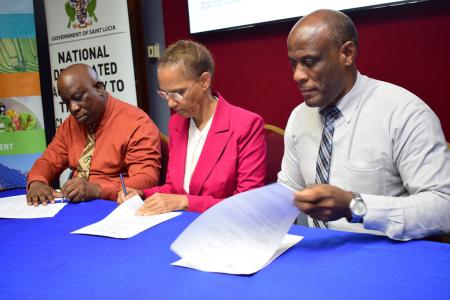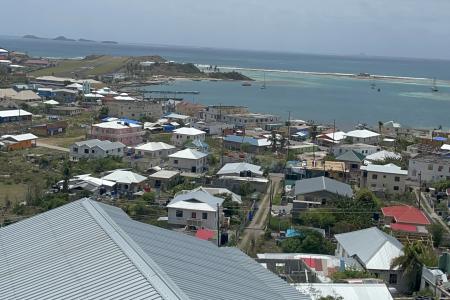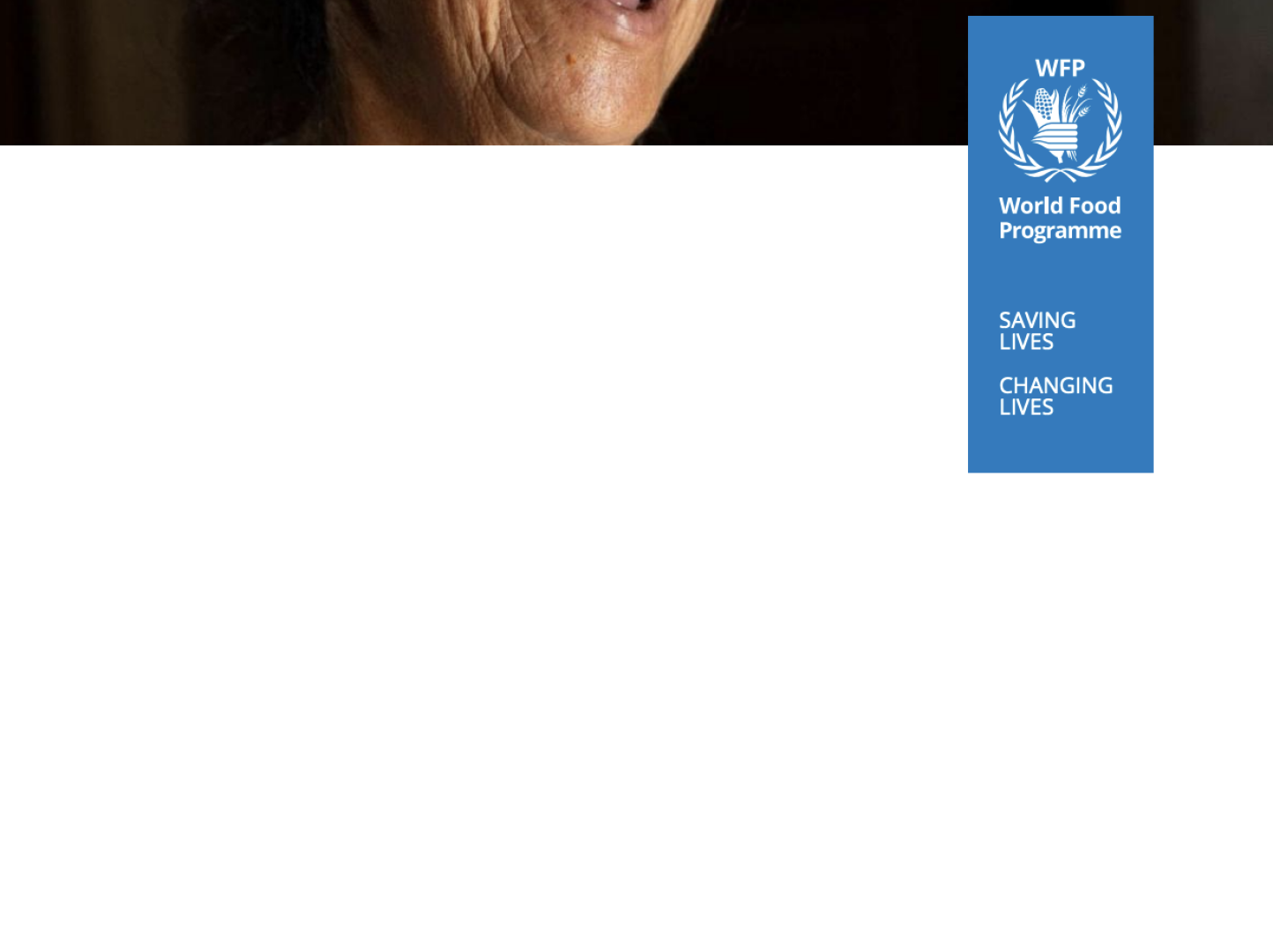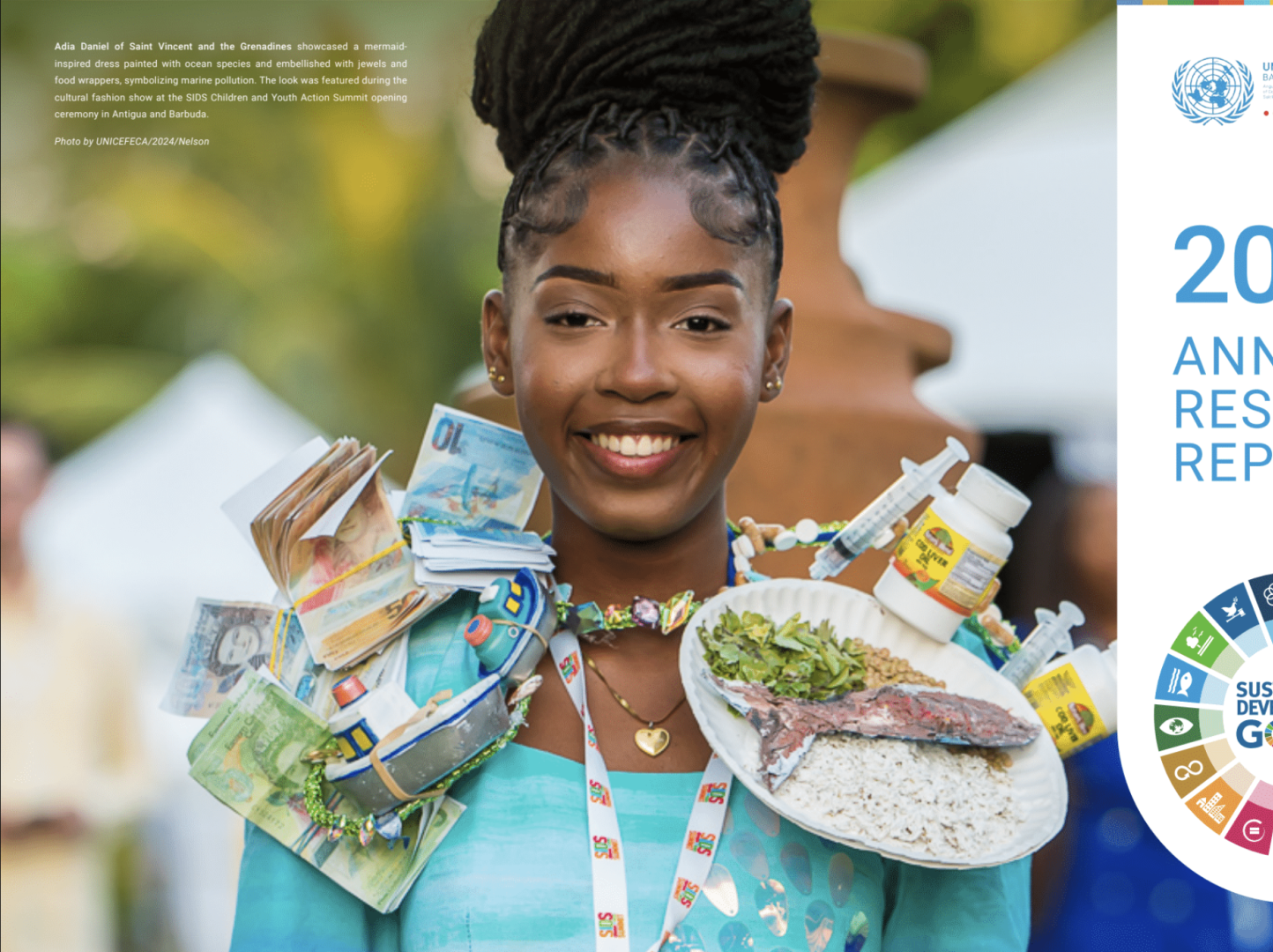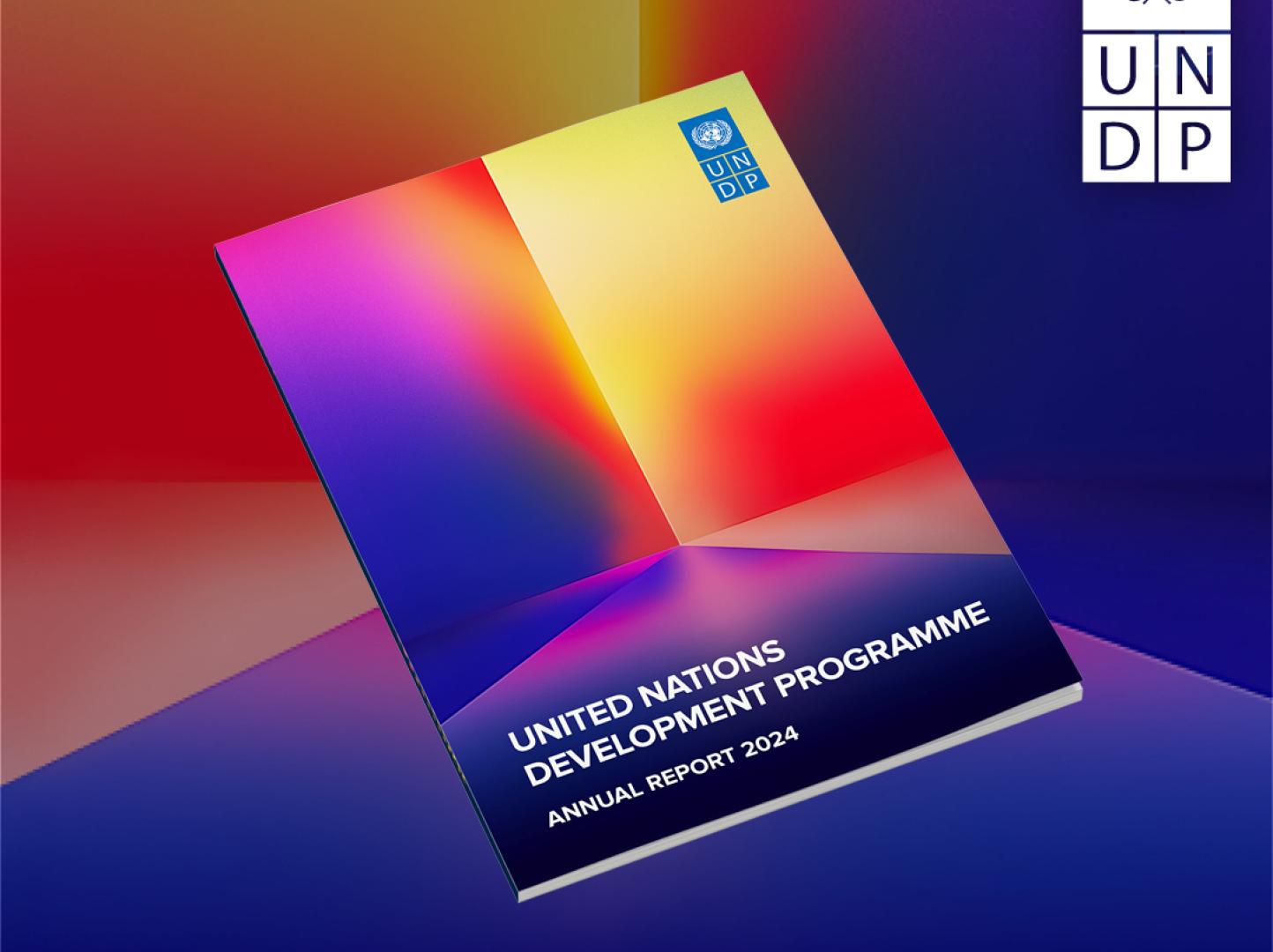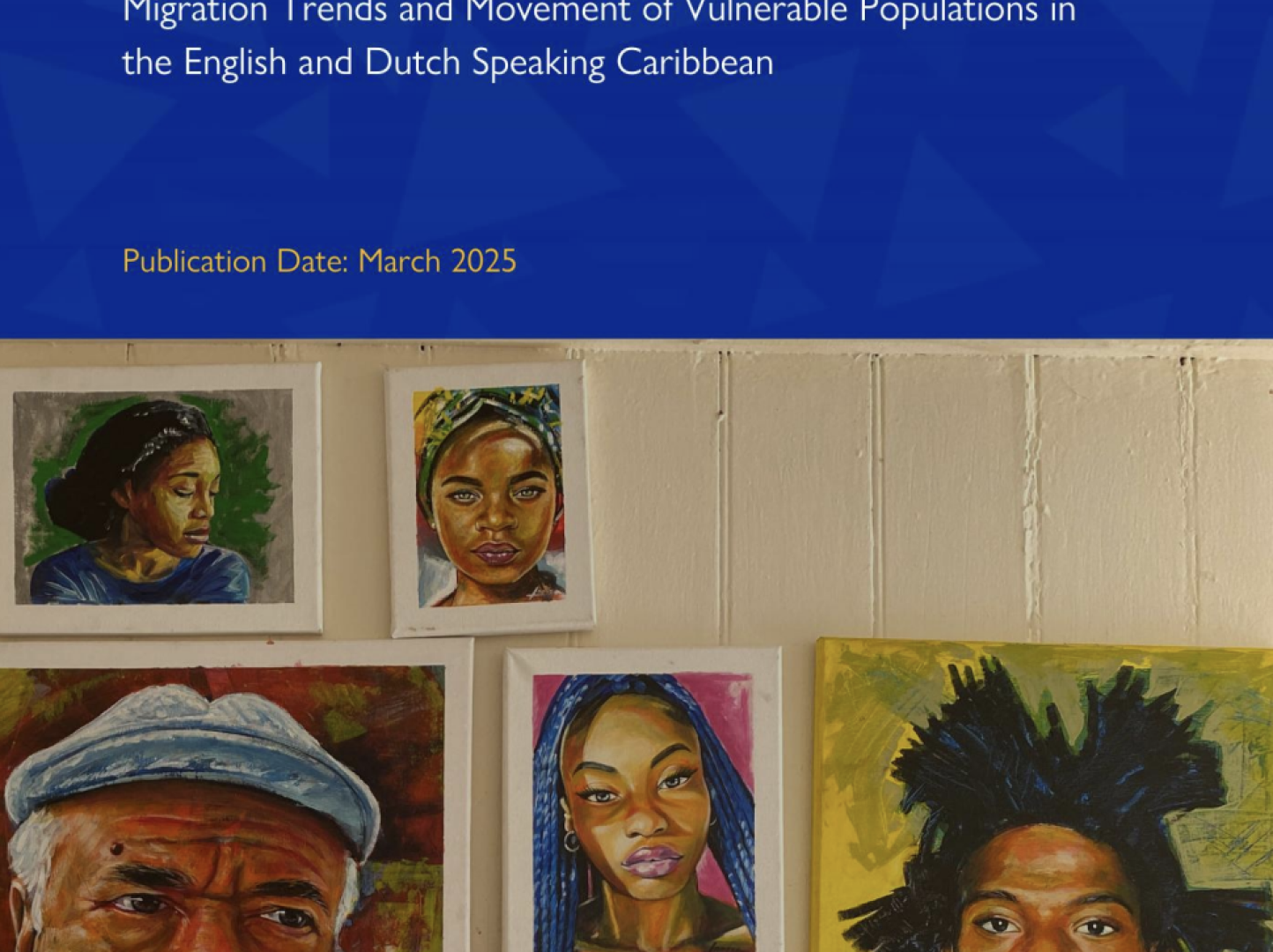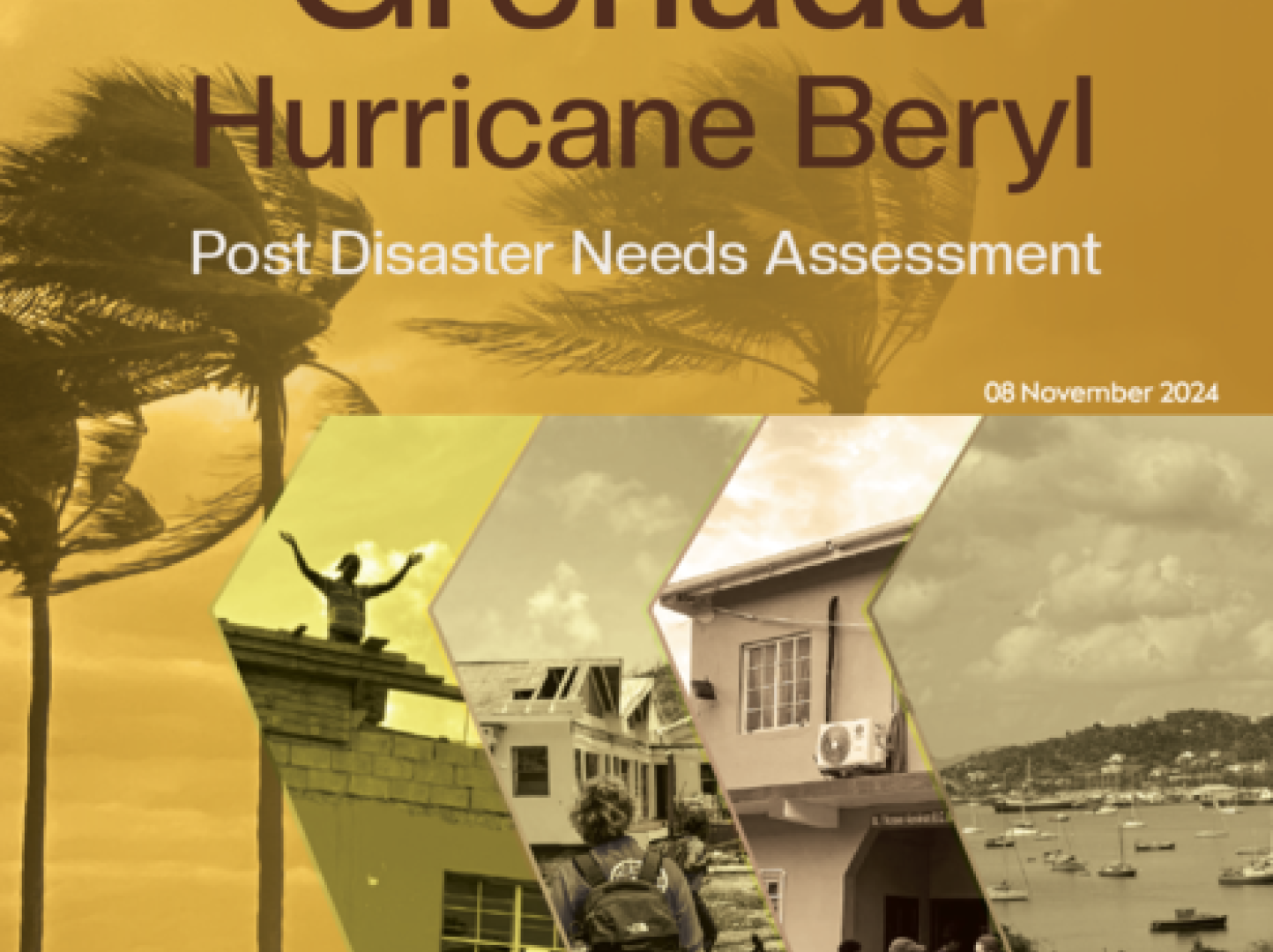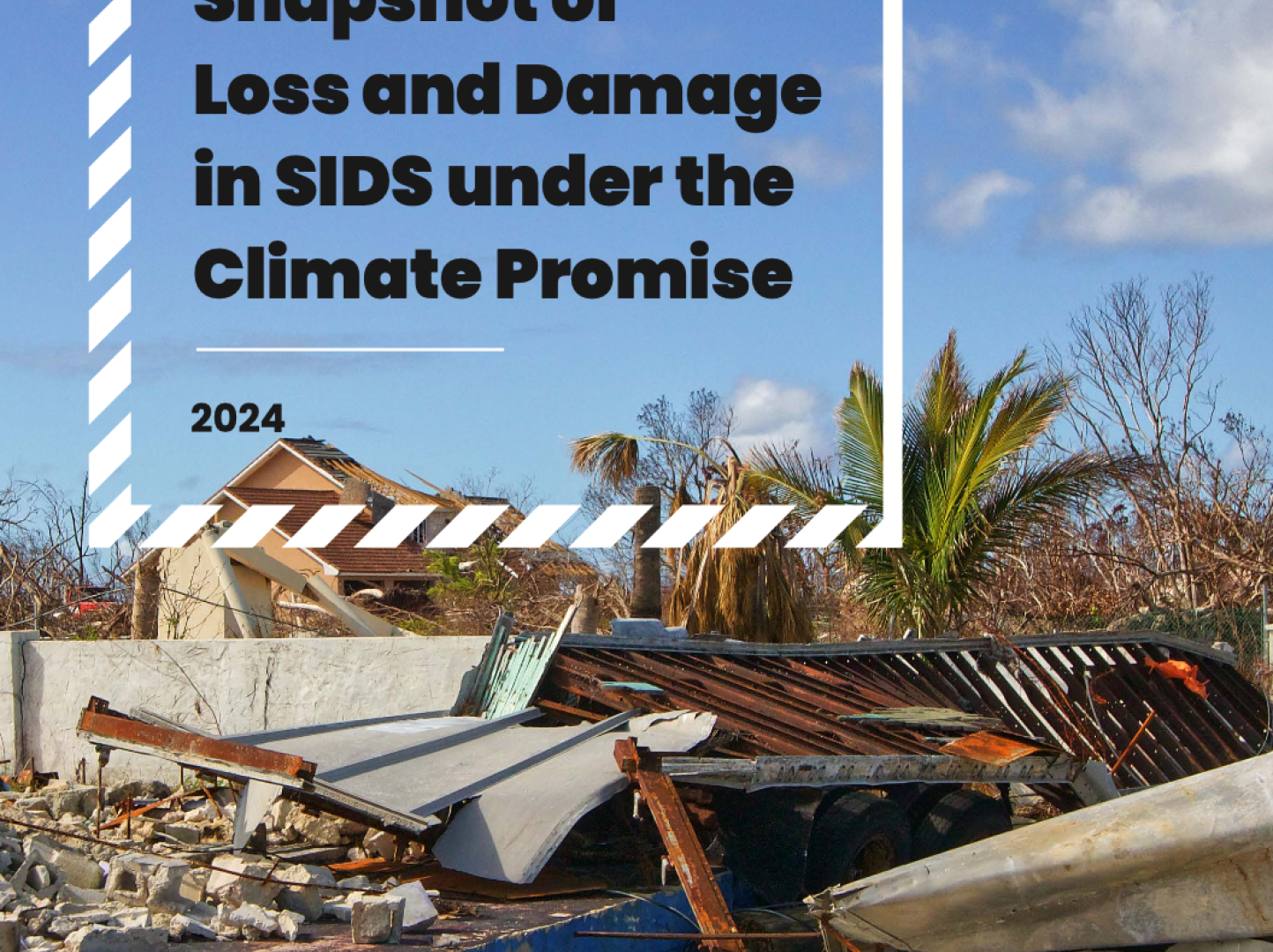Latest
Story
14 July 2025
FAO hosts 20th WECAFC Session to Advance Fisheries Cooperation and Marine Sustainability in the Caribbean
Learn more
Story
14 July 2025
UN Youth Advisory Group to Launch Health and Food Security Podcast Series
Learn more
Story
14 July 2025
A Leafy Success: FAO plays a vital role in transforming the vegetable value chain in Saint Kitts and Nevis
Learn more
Latest
The Sustainable Development Goals in Barbados and the Eastern Caribbean
The United Nations Barbados and the Eastern Caribbean in collaboration with its partners is supporting implementation of the sustainable development goals across the 10 countries covered by our multi-country office (MCO). These 17 Global Goals are a roadmap to address the most pressing challenges facing Caribbean citizens and persons all over the world, to create a sustainable future for all.
Kindly note that the data visualizations show an aggregate of the Caribbean. To view the disaggregated data per country, please click on the name of the country or territory you wish to explore.
Publication
06 March 2025
Hurricane Beryl Post Disaster Needs Assessment (PDNA) - Grenada
This Post-Disaster Needs Assessment (PDNA) report presents the background, context, effects, impact, recovery needs and recovery strategy following the impact of Hurricane Beryl in the tri-island State of Grenada, Carriacou and Petite Martinique. The Government of Grenada requested assistance from the UN Development System, the World Bank and the European Union to conduct a post disaster needs assessment. The multi-donor approach was agreed to as the most suitable approach to avoid duplication of efforts. The report was prepared under the leadership of the Ministry of Economic Development, Planning, Agriculture and Lands, Forestry, Marine Resources and Cooperatives through its Economic Development, Planning and Cooperatives Permanent Secretariat. This PDNA was supported by the Caribbean Disaster Emergency Management Agency (CDEMA), United Nations Agencies (UNRCO, ECLAC, FAO, PAHO, UNDRR, UNESCO, UNICEF, UN Women, UNDP, WFP) and the European Union, with facilitation by the United Nations Development Programme (UNDP). It also benefited from the valuable inputs of bilateral and multilateral partners, such as the World Bank, Caribbean Development Bank (CDB), and the Caribbean Catastrophe Recovery Insurance Facility (CCRIF). It is anticipated that the findings of the PDNA and the specific strategic interventions proposed therein will be utilized as the main blueprint for developing a detailed recovery programme for the country, as well as an instrument for facilitating access to technical and financial resources for the reconstruction and rehabilitation efforts over the short, medium to long term.
1 of 5
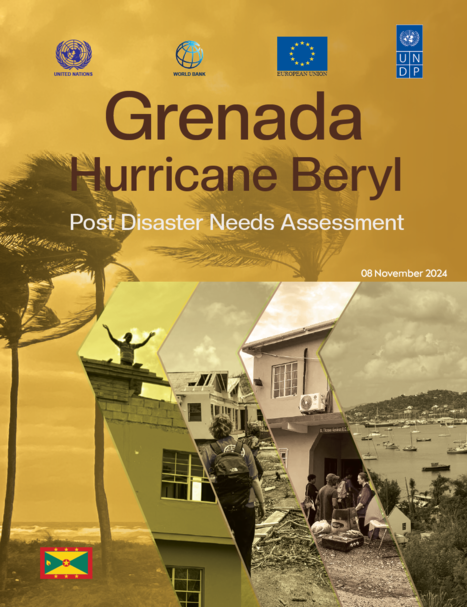
Publication
10 March 2025
Women’s rights in review 30 years after Beijing
In 2025, the world celebrates 30 years of achievement on the Beijing Declaration and Platform for Action, a visionary 1995 plan agreed by 189 governments to achieve the equal rights of all women and girls.The UN Secretary-General’s report on the 30-year review and appraisal of the Beijing Declaration and Platform for Action reflects global, regional, and national reviews of 159 countries, summarizing progress and priorities for further action. It finds that many countries have made strides on gender equality and women’s empowerment, from banning discrimination in employment to adopting gender-responsive climate action plans. Innovation is accelerating progress, and opportunities are opening to scale up proven strategies. Yet gender discrimination remains deeply embedded in all economies and societies, imposing chronic constraints on the rights and hopes of women and girls.Extensive participation in the review reflects the continued relevance and critical importance of the Beijing Platform for Action, including in reaching the global Sustainable Development Goals. Based on the findings, UN Women has collaborated with partners to design the “Beijing+30 action agenda”, which brings people together to realize the promises of the platform and the global goals, reinforcing how everyone has a role to play.This summary report highlights findings from the UN Secretary-General’s report.
1 of 5
Story
20 February 2025
Guterres declares ‘trouble in paradise’ in support appeal for the Caribbean
"The exquisite beauty of the Caribbean is famed the world over. But there is trouble in paradise."United Nations Secretary-General António Guterres sounded the alarm in his address to Caribbean leaders gathered at the opening ceremony of the 48th Regular Meeting of the Conference of Heads of Government of CARICOM on 19 February 2025 in Barbados.From the ongoing socioeconomic impact of the COVID-19 pandemic, to soaring debt and escalating extreme weather events, Guterres described a region beset by crises beyond its control and called for international solutions.Against the backdrop of these compounding challenges, the CARICOM Summit is taking place at the Lloyd Erskine Sandiford Centre in Bridgetown under the theme ‘Strength in Unity: Forging Caribbean Resilience, Inclusive Growth and Sustainable Development’. Heads of State and Government are expected to address a range of issues, including food security, climate change, reparations for historical injustices and regional integration through the CARICOM Single Market and Economy (CSME).In his address, Guterres outlined three key areas where a unified Caribbean is crucial for progress:Unity for Peace and SecurityGuterres emphasised the urgent need to address the crisis in Haiti, where gang rule has inflicted immense suffering on the population. He said that he would soon report to the United Nations Security Council on the situation in Haiti, including proposals on the role the UN can play to support stability and security and address the root causes of the crisis. "It is my intention to present to the Security Council a proposal that is very similar to the one that we have presented for Somalia in which the UN assumes the responsibility of the structural and logistical expenditures that are necessary to put a force in place and the salaries of the force are paid through the trust fund that already exists. And if the Security Council will accept this proposal, we’ll have the conditions to finally have an effective force to defeat the gangs in Haiti and create the conditions for democracy to thrive."He commended CARICOM's support and reiterated his call for a “political process – owned and led by the Haitians – that restores democratic institutions through elections.”The Secretary-General also urged regional leaders to continue tackling the "weapons and drug trafficking that is fuelling violence across the Caribbean", even while appealing to "countries of origin and countries of destination" for stronger cooperation in waging this battle. Unity for Climate ActionAcknowledging the disproportionate impact of climate change on the Caribbean, Guterres stated, "You face a deplorable injustice: A crisis you have done next to nothing to create is wrecking economies, ruining lives, and threatening your very existence." He called for renewed commitment to limiting global temperature rise to 1.5 degrees Celsius above pre-industrial levels and urged G20 countries to lead in the delivery of ambitious climate action plans. All member States adhering to the Paris Agreement are required to submit new Nationally Determined Contributions (NDCs) in 2025, aimed at mitigating and adapting to climate change. Guterres also stressed the need for increased climate finance, adaptation measures, and meaningful contributions to the Loss and Damage Fund."You must be able to find new innovative sources of financing and namely to finally put serious a price on carbon.Unity for Sustainable DevelopmentGuterres emphasised the global challenges in financing the Sustainable Development Goals (SDGs), noting that debt servicing consumes funds while international financial institutions remain underpowered. He praised Caribbean countries for their leadership in pushing for change, stating, "Caribbean countries have been at the forefront of the fight for change – pioneering bold and creative solutions."The Secretary-General highlighted the progress marked by the Pact for the Future, which commits to advancing an SDG Stimulus of $500 billion a year. He noted that the Pact calls for considering structural vulnerabilities in access to concessional funds, including through the Multidimensional Vulnerability Index (MVI). Additionally, it calls for representation in international financial institutions to "correct for the world's vast inequalities and injustices," and for effective action on debt.Guterres urged the implementation of these commitments and emphasized the importance of ensuring all countries can benefit from sustainable development technologies by delivering on the Global Digital Compact.The Secretary-General concluded his address by acknowledging the power of Caribbean unity. "A unified Caribbean is an unstoppable force. I urge you to keep using that power to push the world to deliver on its promise." — UN Secretary-General António GuterresThis story was first published by UNIC
1 of 5
Publication
08 January 2025
2023 Development Partners Landscape Assessment for the Eastern Caribbean
This report is a comprehensive effort to map, analyze, and contextualize the contributions of development partners to the Eastern Caribbean. It provides insights into funding trends, emerging priorities, and areas of strategic alignment. By examining the diverse range of actors, from bilateral and multilateral agencies, this report highlights the evolving dynamics of development financing in the Eastern Caribbean.Moreover, the report provides a basis for increased strategic cooperation and coordination amongst governments in the sub-region and development partners through open and intentional sharing of information on current project portfolios and future needs.
1 of 5
Publication
01 December 2024
Grenada Economic Costs of Violence Study 2023
Violence Against Women and Girls (VAWG) has economic costs for individuals (e.g., victims and their children), families, communities and society at-large. Several countries have estimated the costs of VAWG, in an effort to understand the economic impacts of VAWG on the national economy and to determine investments needed to lessen, if not eliminate VAWG.The direct costs of VAWG include costs that impact the health, police, justice and social welfare systems, as well as costs of victim support services (e.g., shelters, counselling, legal aid). There are also indirect costs related to VAWG, such as: lost employment, wages and productivity; learning time lost; and harm to VAWG survivors and their children. Ultimately, VAWG has negative effects on the lives of women and their children, which undermines poverty reduction measures.Estimating the economic costs of VAWG enables governments to understand the importance of enacting legislation, policies, action plans and programmes aimed at ending VAWG, and allocating an appropriate budget to support effective implementation of such initiatives and provision of quality essential services to VAWG survivors and their children. Estimating the economic costs of VAWG provides a basis for evidence-based decision- and policy-making, and programme development.This VAWG costing study was one of three costing studies conducted in the Caribbean.
1 of 5
Story
14 July 2025
UN Youth Advisory Group to Launch Health and Food Security Podcast Series
With Caribbean youth disproportionately facing complex challenges that threaten their health and overall well-being, the UN Youth Advisory group (YAG) for Barbados and the Eastern Caribbean is providing an avenue to make a positive difference.The YAG, which comprises passionate youth leaders from across the Eastern Caribbean, will this month launch “Youth Speaks” , a monthly podcast series, designed to create an inclusive platform for Caribbean youth to engage with experts, share experiences, and drive advocacy around critical health and social issues affecting the region.Jovanna Ifill, YAG Health and Food Security Team Leader explained: “ From worsening climate crises to mental health struggles, gender-based violence, limited access to sexual and reproductive health services, chronic non-communicable diseases, and the systemic exclusion of persons with disabilities—these issues are all deeply interconnected and disproportionately affect young people.” She further noted that “recent data underscores the need for much more urgent action.”According to UNICEF and PAHO (2024), over 80% of Caribbean youth are concerned about the health impacts of climate change, with many experiencing eco-anxiety due to hurricanes, droughts, and displacement. Mental health services remain limited, despite one in four Caribbean adults living with a mental health condition (Barbados Ministry of Health & Wellness, 2023). Meanwhile, non-communicable diseases like diabetes and obesity are rising among youth, driven by poor nutrition, low physical activity, and climate-related food insecurity (PAHO, 2023). Against this backdrop, Ms. Ifill says the podcast series aims to foster inclusive, youth-centered conversations on pressing health issues to create awareness; integrate intergenerational perspectives to bridge gaps between youth, policy makers and health professionals; and support access to equitable healthcare, positive behavior change and collective advocacy. Ultimately, this initiative will amplify youth voices to advance SDG 3 (Good Health and Well-being) and related Sustainable Development Goals. UN Resident Coordinator, Barbados and the Eastern Caribbean, Simon Springett welcomed this initiative commending the YAG for this timely and potentially impactful initiative. “The ‘Youth Speaks’ podcast is a powerful platform that places young people at the forefront of conversations that matter—on health, climate, equity, and inclusion. It reflects the leadership, creativity, and resilience of Caribbean youth, and the United Nations is proud to support their efforts to drive meaningful change and accelerate progress on the Sustainable Development Goals, especially SDG 3 on Good Health and Well-being”. The YAG is hoping to engage over 500 Caribbean youth between 15 – 30 years via the monthly podcast series to be broadcast on social media platforms. To promote inter-generational support, Ms. Ifill stressed that they are also seeking to reach persons over 30 who can relate to those issues, as well as policymakers, healthcare professionals and youth advocates. To bridge the information gap for audiences who may not traditionally be on social media, she noted that they are also hoping to attract radio sponsorship, to promote the initiative across the region, to reach their target audience in a more equitable way.The series will be launched on Wednesday, 23rd July, 5:30 p.m. – 6:45 p.m. AST with a live Panel Discussion on Climate Change & Mental Health in the Caribbean via zoom. The launch will also feature a moderated Q&A session with regional stakeholders. Participants will include representatives of Caribbean youth networks, regional health and development partners, Government officials and agencies and community organizations.
1 of 5
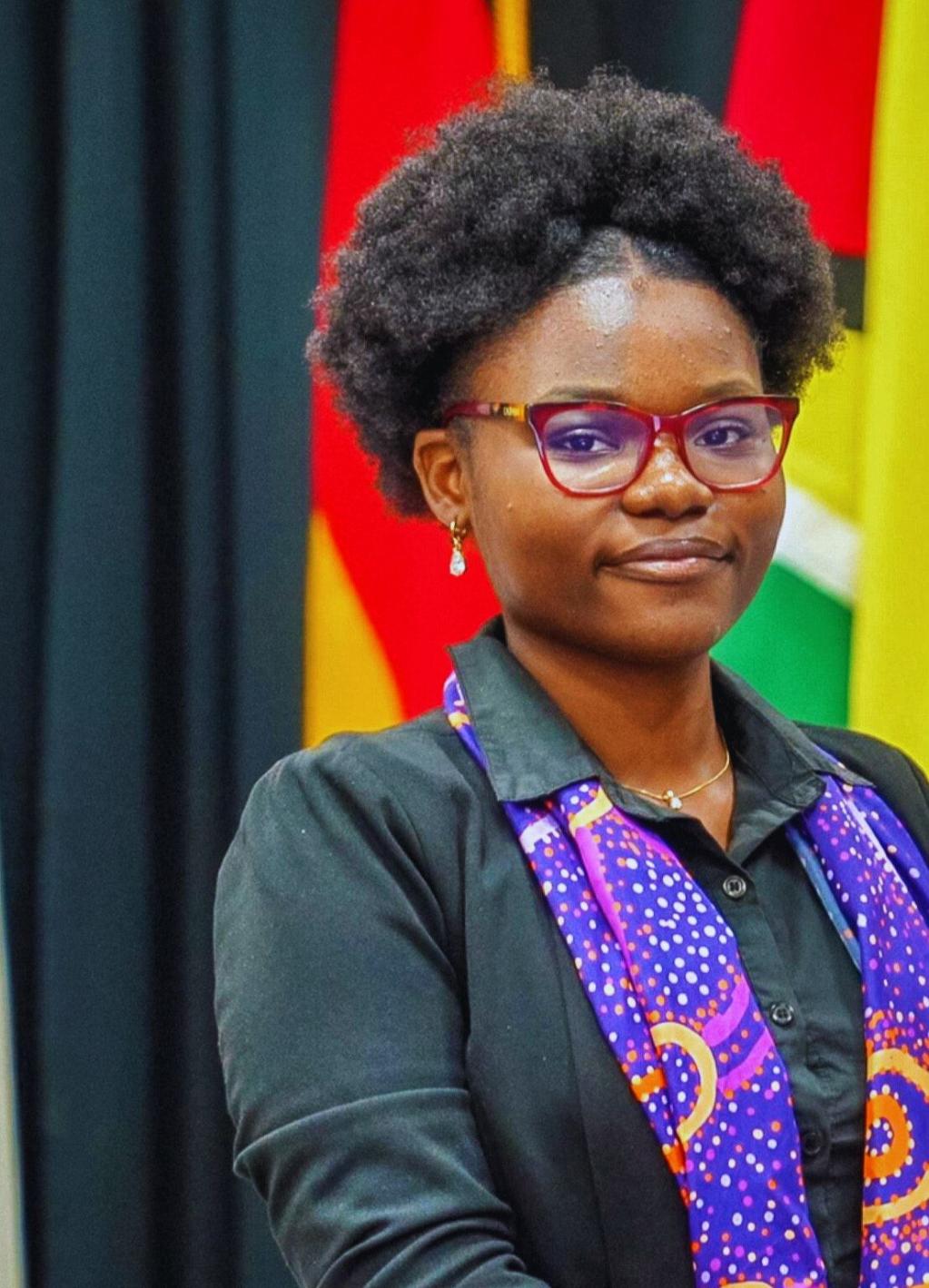
Story
14 July 2025
FAO and the Government of Saint Lucia launch USD $16.7 Million FISH-ADAPT Project to Strengthen Climate Resilience in the Fisheries Sector
Castries, Saint Lucia – The Food and Agriculture Organization of the United Nations (FAO), in collaboration with Saint Lucia’s Ministry of Agriculture, Fisheries, Food Security and Rural Development and the Ministry of Finance, Economic Development and the Youth Economy launched the FISH-ADAPT Project – a transformative initiative valued at USD 16.7 million on Thursday, July 3, 2025. Funded primarily by the Green Climate Fund (GCF) with a contribution of USD 14.75 million, the project also benefits from co-financing by the Ministry of Agriculture (USD 307,250) and the Ministry of Finance (USD 1.66 million), signaling the largest fisheries investment project in Saint Lucia.Over its five-year implementation period, FISH-ADAPT will target approximately 75,000 beneficiaries, including 13,000 direct and 62,000 indirect participants – representing about 41% of Saint Lucia’s population. Direct beneficiaries include marine fishers (3,500), sea-moss farmers (800), fish vendors and processors (500), inland aquaculture farmers (200), and their families.FISH-ADAPT aims to transform Saint Lucia’s fisheries sector by making fishing safer and more productive despite a changing climate. It will foster a circular economy to help reduce waste, enhance resource efficiency, and promote livelihood diversification for more resilient communities. Fish value chains and markets will be strengthened; coastal fish grounds and aquaculture systems will become more climate resilient; and fishers will have more diversified incomes. The project will put in place agrifood solutions that build sustainability and resilience to improve efficiency, safety and productivity in the fisheries sector. These include empowering fishers and aquaculture farmers by enhancing access to weather data, upgrading landing sites and promoting sustainable offshore fishing. It will focus on all fishing zones across the island, prioritizing high-activity sites and those most vulnerable to climate-related hazards. Inland aquaculture operations will also receive targeted support.The Government of Saint Lucia will implement numerous activities including enhancing the safety of fishing operations, increasing the climate-resilience of aquaculture using nature-based solutions, and climate-proofing critical infrastructure, such as boat ramps, jetties, processing facilities, and storage buildings.Strengthening Infrastructure and EcosystemsSaint Lucia’s geographic position and socio-economic dependence on the fisheries sector make it especially vulnerable to the impacts of climate change. Fisherfolk who rely on the sea for their livelihoods are finding it increasingly difficult to adapt to a changing climate and declining fish stocks. Increased air temperature and changing rainfall patterns have also been affecting inland aquaculture. Therefore, FISH-ADAPT will introduce a range of climate-smart solutions to boost productivity, safety, and environmental sustainability in the fisheries sector. This includes improved access to weather data, upgraded landing sites, and support for sustainable offshore fishing – with special focus on women and small-scale operators.Key upgrades of the project include installation of communication and monitoring systems on select vessels, safety training for fishing communities, and the rehabilitation of 15 fish landing sites using engineered and nature-based solutions like mangrove restoration, reef reinforcement, and pier improvements. The targeted communities include Gros Islet, Castries, Anse La Raye, Canaries, Soufrière, Choiseul, Laborie, Vieux Fort, Savannes, Micoud, Praslin, Dennery, Banannes, Cul de Sac, Roseau, and Marigot.The project will also protect and restore critical ecosystems - coastal mangroves in Praslin Bay and Esperance Harbour, and approximately 7 km² of coral reef ecosystems, especially in Soufrière Bay and Saline Point. These interventions will reduce habitat degradation by addressing upstream pollution, siltation, and fertilizer runoff through ecosystem-based management strategies. To bolster aquaculture and seamoss farming, the project will introduce demonstration farms, energy-efficient technologies, and storm-resilient submersible rafts. Synergy with Ongoing InitiativesFISH-ADAPT is fully aligned with Saint Lucia’s own Fisheries Sectoral Adaptation Strategy and Action Plan, thereby positioning itself as a cornerstone of Saint Lucia’s climate resilience and blue economy strategy.During the Signing Ceremony for the project, The Honorable Mr. Alfred Prospere, Minister of Agriculture, Fisheries, Food Security and Rural Development, stated, “The true impact of FISH-ADAPT will not be measured in dollars, but in lives improved, coastlines protected, livelihoods strengthened, and futures made more secure." Mr. Henry Gonzalez, Chief Investment Officer of the Green Climate Fund (GCF), shared a statement indicating that Climate-Resilient Fisheries Project will enhance sustainability and safety in Saint Lucia’s fisheries sector, a key source of livelihoods in one of the world’s most climate-vulnerable Small Island Developing States. In addition, “The approval of this project demonstrates how GCF supports country ownership by strengthening national capacity to enable coastal communities and marine ecosystems to adapt to the impacts of climate change.”Dr. Renata Clarke, Subregional Coordinator for FAO Caribbean highlighted, that, “FISH-ADAPT is a powerful example of how FAO’s mandate to promote sustainable agriculture, food security, and resilience translates into action on the ground. This project strengthens the adaptive capacity of small-scale fishers, protects critical ecosystems, and supports inclusive, climate-resilient livelihoods. We are proud to support Saint Lucia and the wider Caribbean in advancing integrated solutions that safeguard both people and planet, while directly addressing the unique vulnerabilities of Small Island Developing States (SIDS)”. For more information:Jacinto BuenfilPolicy OfficerJacinto.Buenfil@fao.org Lindis NorlundJunior Professional OfficerLindis.Norlund@fao.org Marquita SugrimNational Communications ConsultantMarquitajuanne.sugrim@fao.org
1 of 5
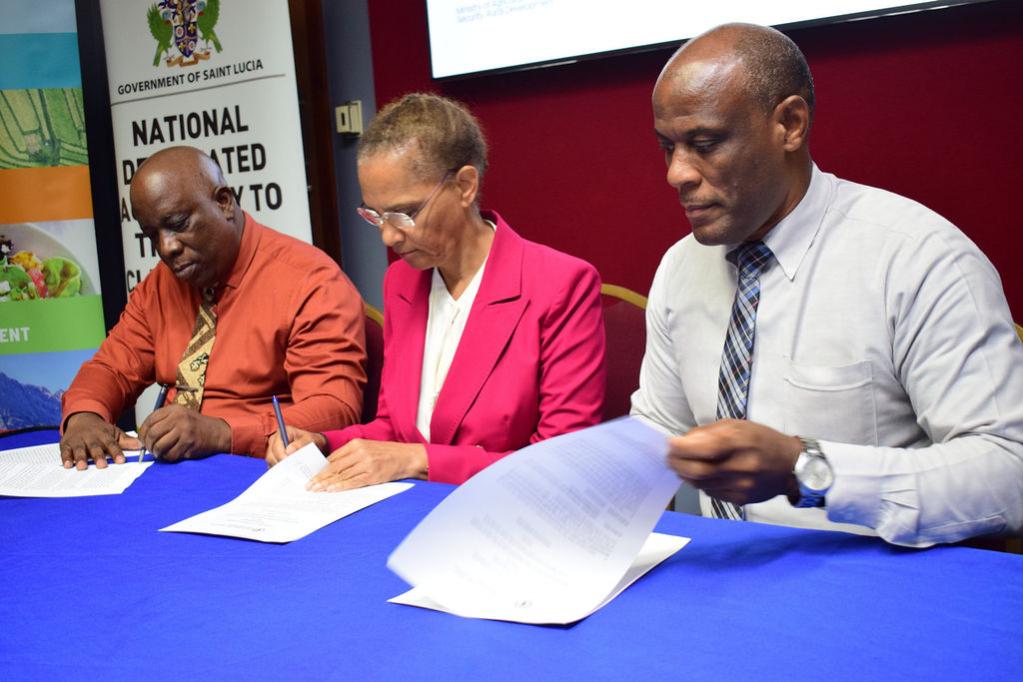
Story
14 July 2025
FAO hosts 20th WECAFC Session to Advance Fisheries Cooperation and Marine Sustainability in the Caribbean
Montego Bay, Jamaica – The Twentieth Session of the Western Central Atlantic Fishery Commission (WECAFC), the largest regional fishery body of the Latin America and the Caribbean under the Food and Agriculture Organization of the United Nations (FAO), officially opened on July 8, 2025, in Montego Bay, Jamaica. Marking the largest-attended biennial session in nearly a decade, this year’s hybrid gathering brought together over 120 participants – 26 members of the Commission, alongside 11 international and regional partner organizations. This included fisherfolk organizations and technical experts convening to review progress, share innovations, and agree on priorities for sustainable fisheries management and marine conservation in the Western Central Atlantic.Over the three-day session, delegates deliberated on key regional priorities, including the strategic reorientation of WECAFC and the implementation of a roadmap to modernize its structure and mandate. Updates from technical working groups will cover progress on species-specific management efforts such as queen conch, spiny lobster, flying fish, dolphinfish, and spawning aggregations. Special attention was given to strengthening regional monitoring systems, including the development of a guidance framework to support countries in implementing regional instruments and tracking progress in areas such as combatting the illegal unreported and unregulated (IUU) fishing, and curbing the effects of climate and protect marine resources, etc.Participants also examined the growing challenges posed by sargassum influxes, explored solutions for managing bycatch and fishery by-products, and assess collaboration opportunities with global bodies including the International Commission for the Conservation of Atlantic Tunas (ICCAT) and the World Trade Organization (WTO). Recent global developments such as the WTO agreement on fisheries subsidies and the United Nations Convention on the Law of the Sea on the Conservation and Sustainable Use of Marine Biological Diversity of Areas beyond National Jurisdiction (BBNJ Agreement) will be discussed in terms of their implications for the region’s fisheries sector.The biennial session opened with statements underscoring the importance of more effective and inclusive management of aquatic resources and the essential regional cooperation to unlock the region’s potential for food security and economic development.“To grow fisheries and aquaculture in the WECAFC region, it is essential to promote sustainable aquaculture, especially in food-insecure areas, and to expand effective management to fisheries facing sustainability challenges. These solutions and actions are central to FAO’s work in the region, supporting sustainable fisheries, aquaculture, and stronger value chains through its Blue Transformation Roadmap,” said the FAO Assistant Director-General and Acting Regional Representative for Latin America and the Caribbean, Maximo Torero.Outgoing Chair for WECAFC, Minister of Agriculture, Fisheries and Mining, Hon. Floyd Green, reflected on the Commission’s progress over the past biennium and urged members to continue building on that foundation through legacy-focused, coordinated action. “Now, more than ever, as the world battles the effects of climate change, food insecurity, and ecosystem degradation, WECAFC continues to stand as an anchor and a buttress while guiding the region towards a resilient, productive and equitable marine resource management system,” he stated.During his keynote, Minister Green cited several key achievements, in strengthening regional fisheries governance. These included the development of action plans, regional management strategies and capacity-building frameworks that promote responsible harvesting and traceability. He emphasized efforts to increase regional information exchange and coordination particularly in combatting IUU fishing and addressing habitat degradation through legal reform and enhanced regional cooperation.At the session, delegates also reviewed the financial and administrative affairs of the Commission, elected new leadership, and adopted the updated 2025–2027 work plan. The chairmanship, previously held over the last intersessional period by CARICOM countries under the leadership of Hon. Floyd Green, Minister of Agriculture, Fisheries and Mining of Jamaica, was officially passed on.Election of New Co-Chairs of WECAFCMexico was elected as the new Chair, represented by Isabel Cristina Reyes Robles, Director of International Affairs at the National Aquaculture and Fisheries Commission. St. Kitts and Nevis assumed the role of Second Vice-Chair, represented by Randell Thompson, Chief Fisheries Officer. The First Vice-Chair, to come from the Central America Fisheries and Aquaculture Organization (OSPESCA) membership, will be designated intersessionally.Building on the achievements of the 2023 session held in Bridgetown, Barbados, the Commission continues to address growing demands for science-based, inclusive and climate-resilient fisheries management, while working to formalize stronger institutional arrangements for regional cooperation.WECAFC 20 positions the region’s fisheries and aquaculture sectors as vital pillars for food security, livelihoods and blue economic development, particularly for Small Island Developing States. -end- Dainalyn SwabyCommunication ConsultantFAO Representation for Jamaica, The Bahamas and Belize dainalyn.swaby@fao.org |876-579-9497
1 of 5
Story
14 July 2025
A Leafy Success: FAO plays a vital role in transforming the vegetable value chain in Saint Kitts and Nevis
Basseterre, Saint Kitts and Nevis – The Food and Agriculture Organization of the United Nations (FAO) is playing a pivotal role in the transition of vegetable farming in Saint Kitts and Nevis from traditional open-field methods to protected agriculture using greenhouse structures, significantly increasing the production of high-value, priority crops. Through its long-standing partnership with the Ministry of Agriculture and drawing on resources from the Technical Cooperation Programme (TCP), FAO has provided comprehensive technical training for farmers and extension officers to strengthen production practices, capacity building for government staff in value chain development, and the provision of essential materials such as greenhouse components, insect nets, and harvest crates.The implementation of the Plant Protection Act and the Saint Kitts and Nevis Agriculture Growth and Transformation Strategy 2022–2031 has provided a solid policy foundation for structured development within key value chains where the market is particularly encouraging to local farmers. In some sectors, farmer earnings have seen marked improvement, bolstered by investments from both the public sector and development partners. In Nevis, a group of progressive farmers has been leading the shift to greenhouse-based vegetable production, particularly lettuce, embracing innovation to improve consistency and quality. With training support from FAO, they have adopted Good Agricultural Practices (GAPs), Integrated Pest Management (IPM), and climate-smart methods. A key intervention was the introduction of closed-circuit hydroponic systems and environmental and water sensors in three greenhouses, enabling precise, data-driven management of crop nutrition, and irrigation. Over the years, the interventions have had a measurable impact. Data from the Department of Agriculture shows that from a baseline of 4,940 kg in 2019, lettuce production volumes rose dramatically to 19,536 kg in 2022 and 45,314 kg in 2023, driven by better practices, and upgraded technologies. These innovative technologies such as the sensors and hydroponic systems are now being further advanced through a focused FAO project titled “Strengthening Protected Agriculture to Improve People’s Livelihoods, Food and Nutrition Security”. The project aims to rehabilitate and enhance greenhouse structures in both Saint Kitts and Nevis, many of which suffered damage from hurricanes.Looking to the future, the integration of digital tools like environmental, soil and water sensors is setting the stage for more intelligent and responsive agricultural practices. According to Mr. Melvin Medina, FAO Plant Production and Protection Officer, “Farmers who adopt digital sensor technologies will gain real-time access to data, enabling them to monitor key factors that directly impact crop yields and make timely, informed decisions.” One such inspiring example is Mr. Richard Paris, a leading commercial greenhouse operator in Nevis, who experienced a significant boost in crop yields after integrating advanced sensor technology into his operations. By installing sensors to monitor key parameters such as air temperature, relative humidity, solar radiation, water pH, water temperature, dissolved oxygen, and electrical conductivity, he was able to pinpoint and address critical issues in real time. Leveraging this data, he implemented targeted improvements across his greenhouse systems. “I am moving to a climate-controlled environment with supplemental lighting to optimize seedling growth,” Mr. Paris explained. “And after removing the shade, I witnessed a dramatic improvement. My yields more than doubled within just 2 to 4 weeks.” FAO’s collaborative efforts with the Ministry of Agriculture along with other partners have laid a solid foundation for sustained growth, increased farmer incomes, and more resilient food systems. As the country progresses toward its 2031 agricultural vision, the vegetable crop value chain driven by innovation, capacity development, and supportive policies emerges as a model of transformation for Small Island Developing States (SIDS). For more information:Melvin Medina NavarroPlant Production and Protection Officer melvin.medinanavarro@fao.org Jefferson JaikissoonAgricultural Value Chain Development Specialist jefferson.jaikissoon@fao.org Marquita SugrimNational Communications Consultant Marquitajuanne.sugrim@fao.org
1 of 5
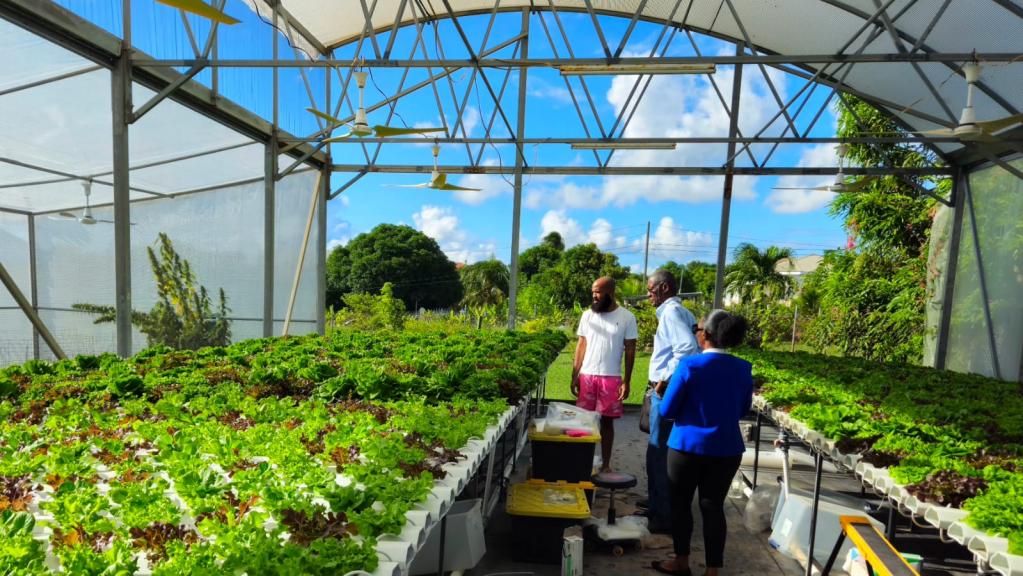
Story
10 July 2025
Caribbean leads in reducing AIDS-related deaths globally, but progress on reducing new infections slow
Kingston, July 10, 2025—Data from the latest Global AIDS Update Report, released by UNAIDS, shows the Caribbean recorded a 62% reduction in AIDS-related deaths, between 2010 and 2024, the steepest decline among eight regions globally. According to the report—AIDS, Crisis and the Power to Transform, over the last fifteen years, there has been a 54% decline in AIDS-related deaths globally. The Caribbean is well above the global average at 62%. The report credits the widespread availability of anti-retroviral treatment (ART) for the progress made since 2010. Reductions have also been recorded in West & Central Africa (60%), Eastern & Southern Africa (59%), Asia & the Pacific (53%), Western & Central Europe and North America (48%), Latin America (31%) and the Middle East & North Africa (6%) while Eastern Europe & Central Asia reported a 48% increase over the same period.UNAIDS commended governments, communities of people living with and most affected by HIV, and key partners, including PEPFAR and The Global Fund, among others for the progress made across the region. “The Caribbean’s stellar performance and achievements are commendable. It shows the resilience of a region constrained by a myriad of social, economic and other challenges such as high debt, declining external funding, and natural disasters and how critical political leadership is to safeguard people’s health without distinction,” Dr Richard Amenyah, the Director of UNAIDS Multi-Country Office in the Caribbean said. “Despite the ongoing challenges, the Caribbean continues to show that great things can be achieved when governments and all stakeholders, including people living with HIV and key populations, work together to protect and promote good health and well-being,” Amenyah said. In 2010, only 53,000 people living with HIV were on treatment in the Caribbean. 13,000 adults and children lost their lives due to AIDS-related conditions that year. However, by 2024, this number climbed to 250,000 people on treatment—with 50,000 of them added between 2020 and 2024. Today, 85% of people living with HIV in the Caribbean know their status, 74% are on treatment, and 66% are virally suppressed (up from 33% in 2017). Last year, deaths declined to 4,800 deaths (down from 6,100 people in 2020).While the organisation applauds stakeholders for the progress in reducing AIDS-related deaths, UNAIDS said it is concerned about the rate of decline in new infections across the region. Noting that the progress is insufficient to reach the targets to end AIDS, UNAIDS urged political leaders, healthcare workers and other stakeholders to do more to prevent new HIV infections.Globally, new HIV infections have been reduced by 40% since 2010 but only 21% of new infections have been reduced in the Caribbean. In 2024, there were 15,000 new infections with Haiti, the Dominican Republic, Cuba, and Jamaica accounting for 90% (Haiti contributed 38%) and young people (15–24 years) account for 25% of new infections overall. UNAIDS’ new report emphasizes integrating HIV into broader health systems, strengthening partnerships with CSOs and communities, and addressing social determinants like stigma and discrimination to prevent new HIV infections, especially among young people and key populations and prevent treatment interruptions. Caribbean governments are also being encouraged to take greater ownership to navigate geopolitical funding shifts, ensuring financial and programmatic sustainability to achieve the 2030 goal of ending AIDS. Noting that domestic funding for the HIV response moved from 30% in 2023 to 38% in 2024, UNAIDS said more needs to be done to achieve the internationally agreed targets to end AIDS as a public health threat. “Governments must continue to prioritize increasing domestic resources, integrate HIV into broader health systems, innovate to keep people living with HIV on treatment toward achieving viral suppression and ensure equitable access for young people and key populations to prevent new infections. Only through sustained partnership and greater country ownership can we end AIDS as a public health threat by 2030 in the region,” Amenyah said.Get more information on the region by accessing the Global AIDS Update 2025: Regional profile for the Caribbean ****** ContactUNAIDS Caribbean | Jaevion Nelson | tel. +1 876 459 3211 | nelsonj@unaids.org UNAIDSThe Joint United Nations Programme on HIV/AIDS (UNAIDS) leads and inspires the world to achieve its shared vision of zero new HIV infections, zero discrimination and zero AIDS-related deaths. UNAIDS unites the efforts of 11 UN organizations—UNHCR, UNICEF, WFP, UNDP, UNFPA, UNODC, UN Women, ILO, UNESCO, WHO and the World Bank—and works closely with global and national partners towards ending the AIDS epidemic by 2030 as part of the Sustainable Development Goals. Learn more at unaids.org and connect with us on Facebook, Twitter, Instagram and YouTube.
1 of 5
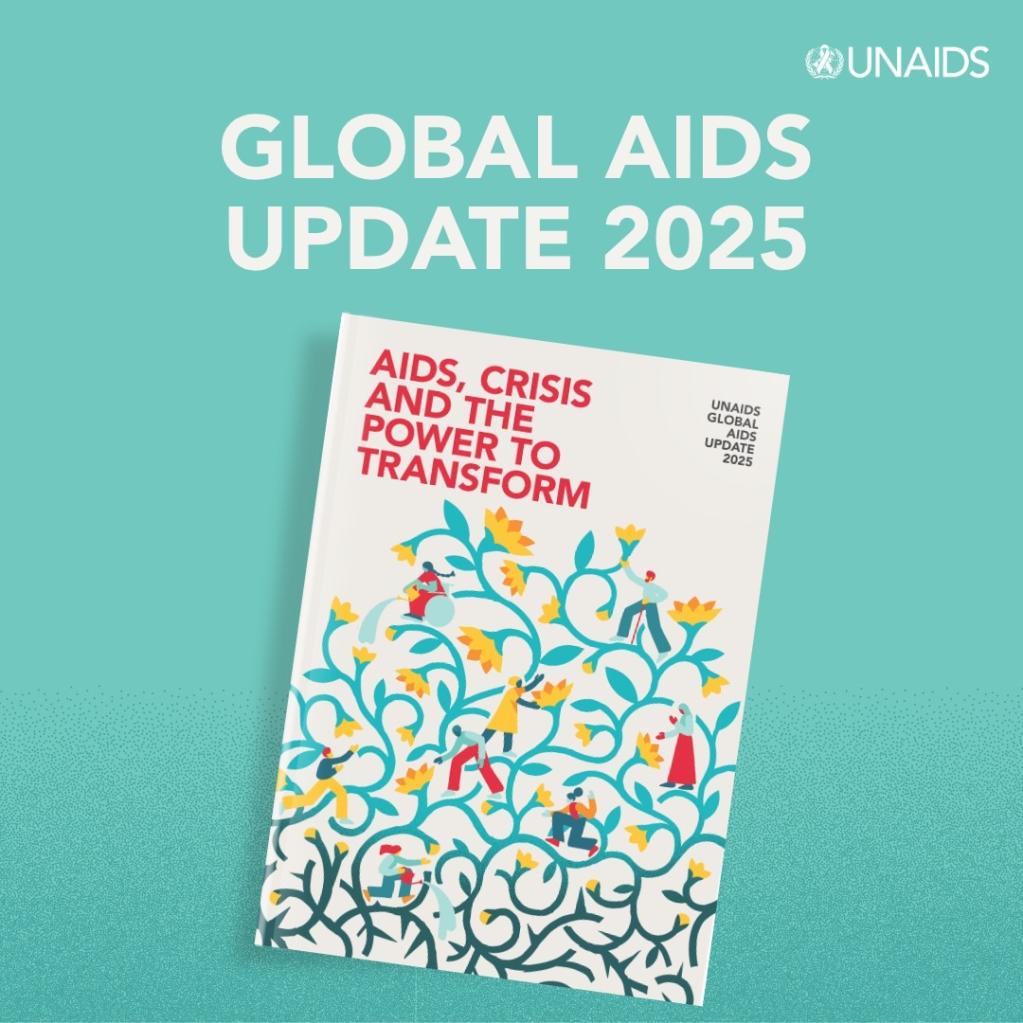
Press Release
14 July 2025
Countries must urgently step up to transform their HIV responses amid an international funding crisis that risks millions of lives
GENEVA/JOHANNESBURG, 10 July 2025—UNAIDS today launched its 2025 Global AIDS Update, AIDS, Crisis and the Power to Transform, which shows that a historic funding crisis is threatening to unravel decades of progress unless countries can make radical shifts to HIV programming and funding.The report highlights the impact that the sudden, large-scale funding cuts from international donors are having on countries most affected by HIV. Yet it also showcases some inspiring examples of resilience, with countries and communities stepping up in the face of adversity to protect the gains made and drive the HIV response forward.Some 25 of the 60 low and middle-income countries included in the report have indicated increases in domestic budgets for their HIV responses in 2026. The estimated collective rise among the 25 countries amounts to 8% over current levels, translating to approximately USD 180 million in additional domestic resources. This is promising, but not sufficient to replace the scale of international funding in countries that are heavily reliant.A global emergency: massive cuts and weakening of aid consensus threaten to reverse progressDespite marked progress in the HIV response in 2024, the weakening aid consensus and significant and abrupt funding shortfalls in the HIV response in 2025 have triggered widespread disruption across health systems and cuts to frontline health workers—halting HIV prevention programmes and jeopardizing HIV treatment services.In Mozambique alone, over 30 000 health personnel were affected. In Nigeria, pre-exposure prophylaxis (PrEP) initiation has plummeted from 40 000 to 6000 people per month. If US-supported HIV treatment and prevention services collapse entirely, UNAIDS estimates that an additional 6 million new HIV infections, and 4 million additional AIDS-related deaths could occur between 2025 and 2029.“This is not just a funding gap—it’s a ticking time bomb,” said UNAIDS Executive Director Winnie Byanyima. “We have seen services vanish overnight. Health workers have been sent home. And people—especially children and key populations—are being pushed out of care.”Even before the large-scale service disruptions, the reported data for 2024 shows that 9.2 million people living with HIV were still not accessing life-saving treatment services last year. Among those were 620 000 children aged 0—14 years living with HIV but not on treatment which contributed to 75 000 AIDS-related deaths among children in 2024.In 2024, 630 000 people died from AIDS-related causes, 61% of them in sub-Saharan Africa. Over 210 000 adolescent girls and young women aged 15—24 acquired HIV in 2024—an average of 570 new infections every day.HIV prevention services are severely disrupted. Community-led services, which are vital to reaching marginalized populations, are being defunded at alarming rates. In early 2025, over 60% of women-led HIV organizations surveyed had lost funding or were forced to suspend services. The United States President’s Emergency Plan for AIDS Relief (PEPFAR) reached 2.3 million adolescent girls and young women with comprehensive HIV prevention services in 2024 and enabled 2.5 million people to use HIV PrEP—many of these programmes have now stopped completely.Meanwhile, the rise in punitive laws criminalizing same-sex relationships, gender identity, and drug use is amplifying the crisis, making HIV services inaccessible. Countries like Uganda, Mali and Trinidad and Tobago have seen recent harmful and discriminatory changes to their criminal laws targeting key populations, pushing them further from care and dramatically raising their risk of acquiring HIV.A beacon of hope: countries and communities are stepping up to protect essential HIV treatment gains and progress is being madeSouth Africa currently funds 77% of its AIDS response and its 2025 budget review includes a 5.9% annual increase in health expenditure over the next three years, including a 3.3% annual increase for HIV and tuberculosis programmes. The government intends to finance the development of a patient information system, a centralized chronic medicine dispensing and distribution system, and a facility medicine stock surveillance system.As of December 2024, seven countries—Botswana, Eswatini, Lesotho, Namibia, Rwanda, Zambia, and Zimbabwe—had achieved the 95-95-95 targets: 95% of people living with HIV know their status, 95% of those are on treatment, and 95% of those on treatment are virally suppressed. These successes must be maintained and further scaled up.The report also highlights the emergence of unprecedented, highly effective new prevention tools like long-acting injectable PrEP, including Lenacapavir, which has shown near-complete efficacy in clinical trials—though affordability and access remain key challenges.“There is still time to transform this crisis into an opportunity,” said Ms. Byanyima. “Countries are stepping up with domestic funding. Communities are showing what works. We now need global solidarity to match their courage and resilience.”A call for solidarity The 2025 Global AIDS Update concludes with an urgent call: the global HIV response cannot rely on domestic resources alone. The international community must come together to bridge the financing gap, support countries to close the remaining gaps in HIV prevention and treatment services, remove legal and social barriers, and empower communities to lead the way forward.UNAIDS emphasizes that every dollar invested in the HIV response not only saves lives but strengthens health systems and promotes broader development goals. Since the start of the epidemic, 26.9 million deaths have been averted through treatment, and 4.4 million children protected from HIV infection through vertical transmission prevention.“In a time of crisis, the world must choose transformation over retreat,” said Ms Byanyima. “Together, we can still end AIDS as a public health threat by 2030—if we act with urgency, unity, and unwavering commitment.”UNAIDS report is being launched ahead of the Scientific AIDS Conference IAS 2025 taking place in Kigali, Rwanda, from 13-17 July 2025.
1 of 5
Press Release
02 July 2025
Caribbean Airports Boost Disaster Readiness Ahead of Hurricane Season
Bridgetown, Barbados - The United Nations World Food Programme (WFP), in collaboration with the Caribbean Disaster Emergency Management Agency (CDEMA), Grantley Adams International Airport (GAIA) Inc., DHL, and the European Union, successfully completed the first-ever ‘Get Airports Ready for Disasters’ (GARD) Workshop in the Eastern Caribbean.The workshop, held at the Grantley Adams International Airport in Barbados, marks a significant step in strengthening regional disaster preparedness ahead of the 2025 hurricane season. This crucial three-day initiative brought together 22 participants, including airport authorities, national disaster management agencies, security forces, regional airlines, and disaster response agencies from Barbados, Antigua and Barbuda, and Trinidad and Tobago. The workshop focused on assessing airport infrastructure, coordination mechanisms, and logistical capacities to manage the surge in humanitarian cargo and passengers that typically follows a major disaster.
Brian Bogart, Representative and Country Director for the World Food Programme Caribbean noted: "Airports are critical in emergencies. They often are the epicentre for coordinating supply chain elements of a response. At WFP, we continue to explore additional options to support maximizing the region's capacity and infrastructure for crisis response."
Frank Losada, DHL Go Help Leader USA & Caribbean and one of the lead trainers for the workshop, emphasized the training's importance for the hurricane-prone Caribbean region. "When there is a disaster, like a hurricane or a tsunami, the airport usually becomes a chokepoint," he explained. "It is critical that airports are ready to receive that cargo and ensure aid gets to people in need as fast as possible."
Reflecting on his experiences during events like the La Soufriere volcano eruption and recent hurricanes in the Caribbean, Hadley Bourne, Chief Executive Officer of GAIA Inc., also welcomed the timely training. "This is very integral to national safety and national development. Disaster management and preparedness is nothing to be taken lightly in any form," he maintained.
Meanwhile, speaking on behalf of CDEMA, Kevon Campbell highlighted the indispensable role of partnerships in supporting communities during crises. "We have seen time and again how disasters, pandemics, and other emergencies test the limits of our regional systems," he said, "But we have also seen how preparatory actions, planning, and partnerships—especially those forged in workshops like this—can make a profound difference in saving lives and restoring order."With a prediction for 17 named storms during the 2025 Atlantic Hurricane season, this workshop sought to better position airports, humanitarian organizations, and private sector agencies to collaborate effectively should the need arise. The GARD workshop is one of several joint activities between WFP and CDEMA, who engage in year-round trainings and simulations across the Caribbean to assess and address gaps in disaster preparedness, ensuring people quickly get the help they need when crisis strikes.
WFP remains committed to strengthening regional logistics and supply chain readiness in the face of growing climate threats across the Caribbean.
#########The United Nations World Food Programme is the world’s largest humanitarian organization saving lives in emergencies and using food assistance to build a pathway to peace, stability and prosperity for people recovering from conflict, disasters and the impact of climate change.
For more information please contact: carla.alleyne@wfp.orgFollow WFP on X, formerly Twitter, via @wfp_media @wfp_Caribbean
Brian Bogart, Representative and Country Director for the World Food Programme Caribbean noted: "Airports are critical in emergencies. They often are the epicentre for coordinating supply chain elements of a response. At WFP, we continue to explore additional options to support maximizing the region's capacity and infrastructure for crisis response."
Frank Losada, DHL Go Help Leader USA & Caribbean and one of the lead trainers for the workshop, emphasized the training's importance for the hurricane-prone Caribbean region. "When there is a disaster, like a hurricane or a tsunami, the airport usually becomes a chokepoint," he explained. "It is critical that airports are ready to receive that cargo and ensure aid gets to people in need as fast as possible."
Reflecting on his experiences during events like the La Soufriere volcano eruption and recent hurricanes in the Caribbean, Hadley Bourne, Chief Executive Officer of GAIA Inc., also welcomed the timely training. "This is very integral to national safety and national development. Disaster management and preparedness is nothing to be taken lightly in any form," he maintained.
Meanwhile, speaking on behalf of CDEMA, Kevon Campbell highlighted the indispensable role of partnerships in supporting communities during crises. "We have seen time and again how disasters, pandemics, and other emergencies test the limits of our regional systems," he said, "But we have also seen how preparatory actions, planning, and partnerships—especially those forged in workshops like this—can make a profound difference in saving lives and restoring order."With a prediction for 17 named storms during the 2025 Atlantic Hurricane season, this workshop sought to better position airports, humanitarian organizations, and private sector agencies to collaborate effectively should the need arise. The GARD workshop is one of several joint activities between WFP and CDEMA, who engage in year-round trainings and simulations across the Caribbean to assess and address gaps in disaster preparedness, ensuring people quickly get the help they need when crisis strikes.
WFP remains committed to strengthening regional logistics and supply chain readiness in the face of growing climate threats across the Caribbean.
#########The United Nations World Food Programme is the world’s largest humanitarian organization saving lives in emergencies and using food assistance to build a pathway to peace, stability and prosperity for people recovering from conflict, disasters and the impact of climate change.
For more information please contact: carla.alleyne@wfp.orgFollow WFP on X, formerly Twitter, via @wfp_media @wfp_Caribbean
1 of 5
Press Release
16 April 2025
OHCHR Strengthens Regional Action to Protect Environmental Defenders in Latin America and the Caribbean
Basseterre, Saint Kitts and Nevis (11 April 2025) – From April 7–11, the Office of the United Nations High Commissioner for Human Rights (OHCHR) co-organized with the Economic Commission for Latin America and the Caribbean (ECLAC), the United Nations Environment Programme (UNEP), UN Women, and the United Nations Development Programme (UNDP), the 3rd Forum on Human Rights Defenders in Environmental Matters in Latin America and the Caribbean, under the Escazú Agreement, held in Basseterre, Saint Kitts and Nevis.This landmark event marked the first official regional gathering on the Escazú Agreement in the Caribbean, bringing together nearly 200 participants from 31 nationalities, including environmental human rights defenders, government representatives, civil society organizations, and international experts.As a co-organizer, OHCHR reaffirmed its commitment to promoting and protecting the rights of environmental defenders throughout the region. The Forum advanced the regional understanding and implementation of Article 9 of the Escazú Agreement, which focuses on the protection of environmental human rights defenders.The dynamic discussions led to a wide array of proposals for an upcoming regional assessment on the situation of environmental defenders—spotlighting significant progress while acknowledging ongoing challenges. A key highlight was the integration of a gender perspective, which resulted in clear, actionable recommendations for gender-responsive protection mechanisms.Through workshops prepared and facilitated by OHCHR, participants also strengthened their knowledge and skills in access to justice and digital security, equipping defenders with practical tools to enhance their safety and impact.The exchange of experiences and innovative ideas fostered stronger regional cooperation networks, laying a robust foundation for future action under the Escazú framework.OHCHR’s leadership in this Forum—spearheaded by the Environment and Civic Space Teams from the LAC Regional Strategies Project (ROSA & ROCA) financed by Sweeden, in close coordination with its CARICOM and Mexico offices—was instrumental in achieving these outcomes. This effort reflects OHCHR’s continued dedication to supporting human rights defenders and building resilient civic spaces across Latin America and the Caribbean.
1 of 5
Press Release
11 February 2025
FAO workshop aimed to enhance Grenada's production of premium, high-quality cocoa
St. Georges, Grenada - January 29, 2025 – Grenada, famously known as the “Spice Isle,” is making significant inroads to improve the quality of its “Trinitario” cocoa and cocoa products. This was the main objective behind the five-day training workshop on cocoa agronomy, post-harvest processing, and sensory analysis from January 20-24, 2025, the collaborative effort of The Food and Agriculture Organization of the United Nations (FAO), the Ministry of Agriculture & Lands, Forestry, Marine Resources & Cooperatives of Grenada and the Grenada Cocoa Association. The training was attended by over 40 participants, including farmers, agro-processors, extension officers, agronomists, plant propagators, and chocolate makers and held at Grenada Cocoa Association’s Processing Facility in Mt. Horne in St. Andrew. Led by experts from the Cocoa Research Centre of the University of the West Indies, including Professor Umaharan, Head, Cocoa Research Centre/Professor in Genetics and Dr Sukha, Research Fellow and Food Technologist, the workshop provided comprehensive insights into sustainable practices, quality enhancement, and flavor profiling. The practical sessions focused on key field management practices such as pruning, grafting, soil fertility, managing pest and diseases, as well as understanding the principles driving cocoa fermentation and activities affecting the flavour profile of cocoa beans and chocolate through sensory evaluation, which equipped participants with tools to monitor how production and post-harvest practices influence flavor, ensuring the region’s continued excellence in specialty cocoa. Ms Anne Desrochers, FAO’s Plant Production and Protection Specialist highlighted, “The training was aimed at empowering farmers, agro-processor and other stakeholders to adopt sustainable practices, enhance productivity and promote the awareness of quality through sensory analysis. Through the knowledge gained, I believe the participants are better equipped to further safeguard the legacy of Caribbean cocoa while unlocking its full potential in the high-value specialty cocoa market.” Reflecting on the knowledge gained, Ms Trishia Marrast, Extension Assistant of the Northern Agricultural District stated, “This training was highly educational, emphasizing the importance of understanding and managing witch’s broom disease and mastering grafting techniques. It provided valuable opportunities for extension officers, farmers, and processors involved in the cocoa industry”. Mr Andel Findley, Production Supervisor at Diamond Chocolate Factory added, “The sessions on post-harvest and fermentation methods were particularly beneficial, providing practical insights into cocoa fermentation and the evolution of new techniques. As a chocolate maker, I found the training refreshing, it reinforced past knowledge and introduced new materials, essential for maintaining high-quality cocoa products”. The training also covered key challenges like, mitigation of cadmium in cocoa, pest and disease control, food safety and farm rehabilitation, equipping stakeholders with the tools to boost productivity sustainably and enhance knowledge on industry standards. Of the seven countries designated by the International Cocoa Association as exclusive 100% fine quality cocoa producers, three are from the CARICOM, including Grenada. The current demand on the international market for Caribbean fine flavour cocoa exceeds the available supply. However, through partnerships and collaborative efforts with the Ministry of Agriculture, revitalizing and enhancing cocoa productivity in Grenada can pave the way for sustainable growth, increased production, and quality cocoa products. For more information, please contact:Anne DesrochersPlant Production and Protection SpecialistAnne.Desrochers@fao.org
1 of 5
Press Release
29 January 2025
FAO Training Enhances Post-Harvest Practices in Dominica
18 January 2024 – Dominica, Roseau – The Food and Agriculture Organization of the United Nations (FAO) held its first post-harvest technology and collaborative training session of the year with the Ministry of Agriculture, Fisheries, Blue and Green Economy for extension officials, processors, and farmers on January 15 at the Fisheries Complex in Roseau, Dominica. During the week-long training led by FAO, the group of 25 participants gained thorough understanding of harvest and post-harvest technology and best practices, with an emphasis on lowering product losses, boosting value chain efficiency, and improving crop quality and safety. Dr Mohammed Majeed, Post-Harvest Specialist, drilled down on critical topics such as post-harvest loss quantification, pre-harvest factors affecting shelf life, quality measurement procedures, packaging, cooling, temperature management and transportation. This approach was successful in providing participants with comprehensive insights on methods to increase the yields of high-value vegetables such as tomatoes, sweet peppers, lettuce, broccoli, cauliflower, cabbage, carrots, and cucumbers. Ahead of the customized training, the Ministry of Agriculture sought FAO’s technical assistance to evaluate the feasibility of growing a variety of vegetables, including imported temperate crops, across Dominica’s diverse agroclimatic zones back in 2023. This scoping study considered key factors such as elevation, year-round water availability for irrigation, and the quality and varieties of seeds available. Findings from the study identified specific agroclimatic zones suitable for cultivating specialty vegetable crops which have the potential to reduce imports, increase farmers’ incomes, and create opportunities for export to neighboring countries. In speaking about the success of the training which considered the island's high susceptibility to climate change and scarcity of arable land, among other agricultural issues, Mrs Anne Desrochers, FAO’s Plant Production and Protection Specialist stated, “improved harvest and post-harvest practices are important to improve quality, minimize food waste and achieve food safety. This training will increase local capacities and knowledge within the Ministry of Agriculture as part of the objectives agreed in the current project of the Technical Cooperation Programme to boost high value vegetable crop production”. Grand Fond farmer Mr Marcus Cuffy who attended the training benefited significantly from the information he learnt, especially about cold storage. He expressed, “the session was very informative. I intend to share the knowledge with other farmers and put what I learnt into practice”. Mr Keian Stephenson, Technical Extension Officer with the Ministry of Agriculture and FAO National Correspondent stated that, "the farmers demonstrated a great deal of interest in ways they can reduce harvest loss during the training,". They learnt simple, but practical methods that will increase the amount of produce that reaches the market and put more money in their pockets. On the other hand, exporters and handlers gained knowledge on how to enhance their packaging and minimize losses in their pack houses”. By applying the skills and insights gained from this training, stakeholders in Dominica’s agricultural sector are now better equipped to strengthen local food production, enhance food security, build a sustainable and resilient future. Contact for more information:Ann DesrochersPlant Production and Protection SpecialistAnne.Desrochers@fao.org
1 of 5
Latest Resources
1 / 11
Resources
11 February 2025
1 / 11


